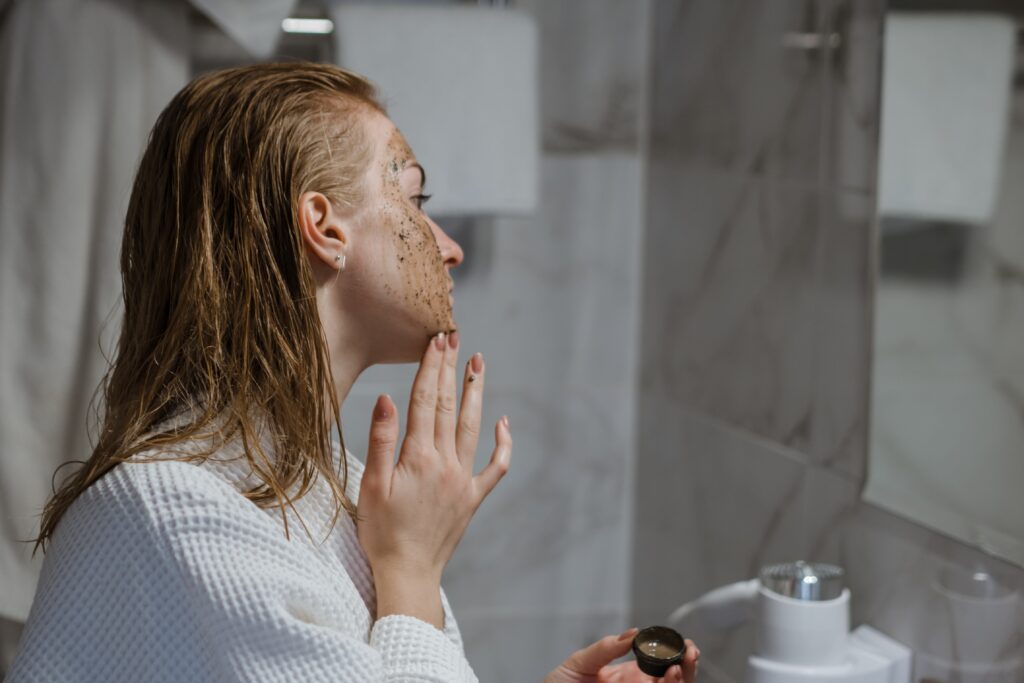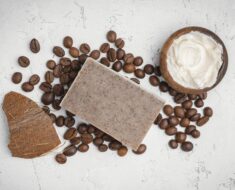Caffeine is the most commonly consumed psychoactive substance globally, and it is present in coffee, tea, soft drinks, and energy drinks.
It is known to boost mood, improve cognitive performance, and increase alertness. But does caffeine cause acne? This question has been a topic of debate in the scientific community for years.
Some studies suggest that caffeine consumption can lead to the development of acne, while others contradict this notion.
In short, caffeine consumption does not cause acne directly, but it can trigger hormonal changes in the body that may lead to acne development.

Caffeine stimulates the adrenal glands to release stress hormones like cortisol, which in turn, can increase oil production in the skin and result in clogged pores. This can cause inflammation, leading to the formation of acne.
To explore this topic further, we have consulted Dr. Jessica Wu, a board-certified dermatologist, and author of “Feed Your Face,” who has extensively studied the relationship between diet and skin health.
In this article, we will delve into the effects of caffeine on the skin and examine whether it is a significant contributing factor to acne.
So, let’s discover the truth behind the myth and learn how to maintain healthy, clear skin.
Does Coffee Cause Acne? Research revealed
The relationship between coffee and acne is a topic of debate and research in the scientific community. While some studies suggest that caffeine may have a negative effect on acne, others have found no significant correlation.
One study published in the Journal of Drugs in Dermatology in 2018 suggested that caffeine intake could increase the risk of acne in certain individuals.
The study involved 1,200 participants and found that those who drank more than three cups of coffee per day were more likely to have acne breakouts.
However, other research has suggested that caffeine may actually have a beneficial effect on acne.
A study published in the Journal of Investigative Dermatology in 2014 found that caffeine had a protective effect against UV radiation-induced skin damage and inflammation, which are both factors that can contribute to acne.
Overall, the research on the relationship between coffee and acne is inconclusive. While some studies suggest that caffeine may have a negative effect on acne, others have found no significant correlation.
It is important to remember that everyone’s skin is different and may react differently to various substances, including caffeine.
If you are concerned about the effect of coffee on your acne, it may be helpful to talk to a dermatologist.
Now see does coffee can raise your stress level?.
Coffee Can Raise Your Stress Levels
Caffeine, the main active ingredient in coffee, is a stimulant that can affect the body in various ways. While moderate caffeine consumption is generally safe for most people, excessive intake can lead to increased levels of stress and anxiety.
When you consume caffeine, it triggers the release of cortisol, a hormone that is associated with stress. Cortisol helps the body respond to stress by increasing blood sugar levels and providing energy.
However, prolonged exposure to cortisol can have negative effects on the body, including increased blood pressure and a weakened immune system.
In addition to its effects on cortisol, caffeine can also cause physical symptoms of stress, such as rapid heartbeat, sweating, and shaking.

These symptoms can be particularly pronounced in people who are sensitive to caffeine or who consume large amounts of it.
If you find that coffee is causing you to feel more stressed or anxious, it may be helpful to reduce your caffeine intake or switch to decaf.
It is also important to practice other stress-reducing activities, such as exercise, meditation, or deep breathing, to help manage stress levels.
Caffeine
Caffeine, which is found in coffee, is a stimulant that can affect the body in various ways. While it can provide a boost of energy and alertness, excessive caffeine consumption can lead to increased levels of stress and anxiety.
When you consume caffeine, it triggers the release of cortisol, a hormone that is associated with stress. Cortisol helps the body respond to stress by increasing blood sugar levels and providing energy.
However, prolonged exposure to cortisol can have negative effects on the body, including increased blood pressure and a weakened immune system.
In addition to its effects on cortisol, caffeine can also cause physical symptoms of stress, such as rapid heartbeat, sweating, and shaking.
These symptoms can be particularly pronounced in people who are sensitive to caffeine or who consume large amounts of it.
If you find that coffee is causing you to feel more stressed or anxious, it may be helpful to reduce your caffeine intake or switch to decaf.
It is also important to practice other stress-reducing activities, such as exercise, meditation, or deep breathing, to help manage stress levels.
Milk
While coffee itself can raise stress levels due to its caffeine content, adding milk to coffee may actually have a calming effect.
Milk contains tryptophan, an amino acid that helps to produce serotonin, a neurotransmitter that is associated with feelings of calmness and relaxation.
In addition, milk also contains calcium, which has been shown to have a calming effect on the nervous system. Research has suggested that calcium can help to reduce the production of cortisol, a hormone that is associated with stress.
However, it is important to note that some people may be sensitive to milk or lactose intolerant, which can cause digestive issues and discomfort. In these cases, adding milk to coffee may not be helpful in reducing stress levels.
Overall, while coffee itself can raise stress levels due to its caffeine content, adding milk to coffee may have a calming effect for some people. However, it is important to be mindful of any potential sensitivities or intolerances to milk.
Sugar
Adding sugar to your coffee can contribute to raising your stress levels. While a small amount of sugar may not have a significant effect on stress, consuming excessive amounts of sugar can have negative effects on both physical and mental health.
When you consume sugar, it triggers a release of insulin, a hormone that regulates blood sugar levels. Consuming large amounts of sugar can cause a spike in insulin, which can result in a sudden drop in blood sugar levels, also known as a sugar crash. T
his can lead to feelings of fatigue, irritability, and anxiety, which can contribute to overall stress levels.
In addition, consuming excessive amounts of sugar has been linked to a variety of health problems, including obesity, diabetes, and heart disease.
These conditions can cause chronic stress on the body, which can further exacerbate feelings of stress and anxiety.
If you want to reduce the negative effects of sugar on your stress levels, it may be helpful to limit your sugar intake or choose healthier alternatives, such as natural sweeteners like honey or maple syrup.
Additionally, practicing stress-reducing activities like exercise, meditation, or deep breathing can help manage stress levels overall.
Antioxidants
While coffee itself can raise stress levels due to its caffeine content, it also contains antioxidants that can have potential health benefits.
Antioxidants are compounds that can help to protect the body from damage caused by harmful molecules called free radicals.
Some studies have suggested that the antioxidants in coffee may help to reduce the risk of certain diseases, such as Parkinson’s disease, type 2 diabetes, and liver disease.
These antioxidants can also help to reduce inflammation in the body, which is associated with a variety of health problems.
However, it is important to note that the amount of antioxidants in coffee can vary depending on factors such as the type of coffee, how it is prepared, and how it is consumed.
Additionally, the potential health benefits of coffee antioxidants may be outweighed by the negative effects of excessive caffeine consumption, such as increased stress and anxiety.
Overall, while coffee can provide some antioxidants that may have potential health benefits, it is important to consume it in moderation and be mindful of its potential negative effects on stress levels.
Should ditch your morning latte?
Whether or not you should ditch your morning latte depends on a variety of factors, including your personal health goals and how your body responds to caffeine.
If you find that your morning latte is causing you to feel more stressed or anxious, it may be helpful to reduce your caffeine intake or switch to decaf.

It is also important to practice other stress-reducing activities, such as exercise, meditation, or deep breathing, to help manage stress levels.
However, if you enjoy your morning latte and it does not cause negative effects on your health or stress levels, there may be no reason to give it up.
In fact, some studies have suggested that moderate coffee consumption may have potential health benefits, such as reducing the risk of certain diseases and improving cognitive function.
It is important to note that the health effects of coffee can vary depending on factors such as the type of coffee, how it is prepared, and how it is consumed.
Additionally, if you add milk and sugar to your latte, it is important to be mindful of the potential negative effects of excessive sugar consumption.
Overall, the decision to ditch your morning latte should be based on a consideration of your personal health goals and how your body responds to caffeine and other coffee additives.
Drinking coffee without worsening acne
If you are concerned about drinking coffee and its potential impact on acne, there are some things you can do to help minimize any negative effects.
1. Consuming less caffeine overall:
Try to limit your coffee intake to one or two cups per day. This can help to reduce your overall caffeine intake, which can contribute to stress and anxiety, which in turn can worsen acne. You can also consider switching to decaf coffee or drinking herbal tea instead.
2. Cutting back on sugar:
Avoid adding sugar or artificial sweeteners to your coffee, as excessive sugar consumption can contribute to acne. If you need to sweeten your coffee, consider using natural sweeteners like honey or stevia in moderation.
3. Reducing low-fat or skimmed milk:
Dairy products, including low-fat or skimmed milk, have been linked to acne in some people. Consider switching to non-dairy milk alternatives like almond, soy, or oat milk.
Overall, making healthy lifestyle choices can help to minimize the potential negative effects of coffee on acne.
Additionally, practicing good skincare habits, such as washing your face twice a day and using non-comedogenic products, can help to prevent and manage acne.
Let move to some related faq’s






